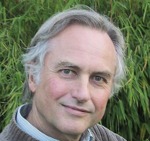An Appetite for Wonder: The Making of a Scientist
A Conversation with Richard Dawkins
Monday, 17 Nov 2014 at 8:00 pm – Stephens Auditorium, Iowa State Center
No tickets required | Doors open at 7:15 | General admission seatingRichard Dawkins, evolutionary biologist and secularist, is the Charles Simonyi Professor of the Public Understanding of Science at Oxford. The publication of his book The Selfish Gene in 1976 sparked a revolution in biology and made Dawkins well known beyond his field of study. His most recent book is An Appetite for Wonder: The Making of a Scientist. His many other publications include The Ancestor's Tale, The Blind Watchmaker, Climbing Mount Improbable, Unweaving the Rainbow, and A Devil's Chaplain. He is also the founder of the Richard Dawkins Foundation for Science and Reason with the mission to remove the influence of religion in science education and public policy, and eliminate the stigma that surrounds atheism and non-belief. Bioethics Program Director Clark Wolf will moderate the discussion. National Affairs Series on Innovation
Due to the file size, this podcast may take additional time to load.
About the book:
In An Appetite for Wonder, Richard Dawkins shares a rare view into his early life, his intellectual awakening at Oxford, and his path to writing The Selfish Gene. He paints a vivid picture of his idyllic childhood in colonial Africa, peppered with sketches of his colorful ancestors, charming parents, and the peculiarities of colonial life right after World War II.
Arriving at Oxford in 1959, Dawkins began to study zoology and was introduced to some of the university's legendary mentors as well as its tutorial system. It's to this unique educational system that Dawkins credits his awakening, as it invited young people to become scholars by encouraging them to pose rigorous questions and scour the library for the latest research rather than textbook "teaching to" any kind of test. His career as a fellow and lecturer at Oxford took an unexpected turn when, in 1973, a serious strike in Britain caused prolonged electricity cuts, and he was forced to pause his computer-based research. Provoked by the then widespread misunderstanding of natural selection known as "group selection" and inspired by the work of William Hamilton, Robert Trivers, and John Maynard Smith, he began to write a book he called, jokingly, "my bestseller." It was, of course, The Selfish Gene.
Here, for the first time, is an intimate memoir of the childhood and intellectual development of the evolutionary biologist, and the story of how he came to write what is widely held to be one of the most important books of the twentieth century.
Cosponsored By:
- Animal Science
- Baker Ctr Bioinformatics and Biological Statistics
- Bioinformatics and Computational Biology
- Chemistry
- College of Agriculture & Life Sciences
- College of Human Sciences
- College of Liberal Arts & Sciences
- Ecology and Evolutionary Biology
- Ecology, Evolution & Organismal Biology
- Entomology
- Genetics, Development, and Cell Biology
- Geological & Atmospheric Sciences
- George Gund Lecture Fund
- Graduate & Professional Student Senate
- Horticulture
- Interdepartmental Genetics Program
- Interdepartmental Toxicology
- National Affairs
- Natural Resource Ecology and Management
- Neuroscience Graduate Program
- Philosophy & Religious Studies
- University Library
- Wake Up
- Committee on Lectures (funded by Student Government)
Stay for the entire event, including the brief question-and-answer session that follows the formal presentation. Most events run 75 minutes.
Sign-ins are after the event concludes. For lectures in the Memorial Union, go to the information desk in the Main Lounge. In other academic buildings, look for signage outside the auditorium.
Lecture Etiquette
- Stay for the entire lecture and the brief audience Q&A. If a student needs to leave early, he or she should sit near the back and exit discreetly.
- Do not bring food or uncovered drinks into the lecture.
- Check with Lectures staff before taking photographs or recording any portion of the event. There are often restrictions. Cell phones, tablets and laptops may be used to take notes or for class assignments.
- Keep questions or comments brief and concise to allow as many as possible.





